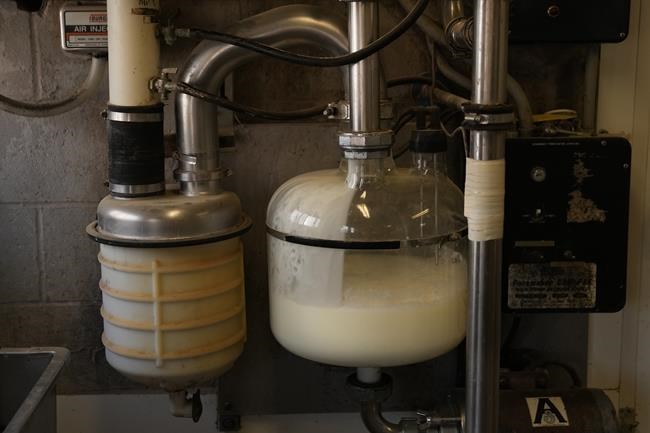An Israeli food tech company says it now has the green light to sell its lab-grown milk protein to dairy manufacturers and food companies in Canada.
Remilk said Monday it received a "letter of no objection" from Health Canada regarding its version of the BLG protein, which can be used as a non-animal source ingredient in products that look and taste like traditional milk, cheese, yogurt and ice cream.
The protein is equivalent to its cow-derived counterpart but no animals are involved in its creation through a process called precision fermentation, the company said, adding that it's seeking a Canadian partner to help launch and distribute its product.
Animal-free dairy is more environmentally sustainable than traditional dairy production, and it also doesn't contain lactose, cholesterol or growth hormones, Remilk said.
A notice posted on Health Canada's website confirms the federal agency has no objection to the use of the animal-free milk protein in food, and no safety concerns.
Health Canada received a submission in 2022 to allow the sale of the BLG protein produced from a genetically modified yeast strain and scientists conducted a thorough analysis of the data Remilk provided, the notice said.
"Following this assessment, it was determined that the β-lactoglobulin protein produced in this yeast strain does not pose a greater risk to human health than whey protein from cow's milk that is currently available on the Canadian market," it said.
This protein "is no different in nutritional value compared to whey protein from cow's milk," Health Canada said.
It noted, however, that the protein may produce the same allergic response as milk when it's consumed, so all products containing it must be labelled accordingly.
“Canada is an important market for us, and we are proud to be the first to enter with an opportunity to deliver an unparalleled dairy experience for Canadians," Remilk said in a statement, noting it received a similar "no questions" letter from the U.S. Food and Drug Administration and got regulatory approval in Israel last year.
"We are now ready to partner with leading food companies in the country and offer consumers a whole new experience of guilt-free indulgence."
Health Canada said Remilk's intent is to sell this protein in bulk to food manufacturers for use in a variety of products such as nutrition bars, plant-based beverages, dairy-based products, baked goods, sauces, condiments and soups.
The regulator said the protein is not intended for sale direct to consumers or for use in infant formula.
This report by The Canadian Press was first published on Feb. 5, 2024.
The Canadian Press



